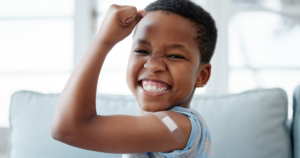Sophia L. Thomas, DNP, FNP-BC, PPCNP-BC, FNAP, FAANP
November is National Lung Cancer Awareness Month, and this year, understanding how to keep your lungs healthy, identify issues early and treat lung disease effectively has never been more critical. People living with lung cancer are among those at high risk for contracting COVID-19, according to the Centers for Disease Control and Prevention (CDC).
For patients living with lung cancer, there are actions you can take to reduce your risk of contracting COVID-19:
Talk to your health care provider. You should regularly consult with your health care team to assess your individual risk of catching COVID-19 based on your condition, treatment plan and the level of transmission in your community.
Take your medication. You should not stop taking your medicine or alter your treatment plan unless otherwise instructed by your health care provider.
Receive your treatment on time. Unless otherwise instructed by your health care provider, you should stick to your treatment plan and make arrangements to receive all treatment on time.
Monitor your condition. Continuously monitor your health and talk to your provider if your condition changes, you are feeling unwell or you believe you’ve been exposed to COVID-19.
One of the many negative side effects of COVID-19 is that some patients are skipping primary care and regular checkups out of fear they will be exposed to the virus. As a result, the number of cancer screenings has declined, and with it, the number of individuals receiving the treatment they need.
Patients receiving cancer treatments — like chemotherapy — can become immunocompromised, increasing their risk of contracting COVID-19. According to the CDC, chemotherapy can increase the risk of infection because:
- It kills the fastest-growing cells in the body — both cancer cells and good cells.
- White blood cells in your body are the good cells that help your body fight off infections.
- With fewer white blood cells in your body, you aren’t able to fight off infections as effectively, which increases your risk for catching viruses, like COVID-19.
To lower your risk of catching COVID-19 or other viruses while receiving chemotherapy, follow these CDC recommendations:
- Wash your hands with soap and water for 20 seconds, as frequently as possible.
- Get a flu shot every year. Ask your health care provider if you should get a pneumococcal shot and about the best types and timing of vaccines for you.
- Take a shower or bath every day with warm water and mild soap.
- Brush your teeth several times per day with a soft toothbrush.
- Protect yourself from cuts and be careful with sharp objects.
- If you get a small cut, wash it thoroughly, use antibacterial cream and cover it with a bandage.
Patients fighting lung cancer need access to high-quality care and treatments, while limiting the potential for exposure to COVID-19. To help make the best choices for your own care, ask your nurse practitioner or other health care provider for guidance. Together, we can beat cancer and COVID-19.

